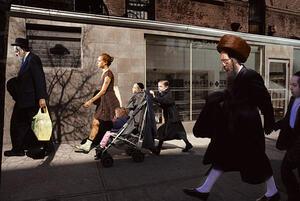Hipsters, Hasids and the war over women's bodies
Photograph by Peter Rad/New York Magazine
I am neither Hasid or hipster, yet I am linked to both fringe communities in different ways. Every generation has a counter-culture, and every religion has a fundamentalist extreme. The hipsters are my friends, and the Hasids are my tribe. They both live in the same neighborhood in New York City, and they are at war over women's bodies and bike lanes.
South Williamsburg is home to the Satmars, the largest ultra-Orthodox Hasidic Jewish sect in the world. The Satmars came to the area after World War II with the intention of reproducing the traditional shtetl in New York brownstones. North Williamsburg, where the hipster counter-culture movement was born, is considered the original and premiere hipster community in the U.S.
 It's not exactly easy to explain what a hipster is, but the key to understanding the counter-culture is irony. The best explainations can be found at Wikipedia or "Stuff Hipsters Hate" (a blog similar to the popular "Stuff White People Like"). Hipsters are typically 20-something modern bohemians clad in "ironic" t-shirts, skinny jeans, American Apparel hoodies, and plastic neon sunglasses. They sport androgynous haircuts, beards, piercings and tattoos. They smoke cigarettes, do drugs, and drink Pabst Blue Ribbon beer. They do all of this because it's "ironic." They are super thrifty, buying the cheapest everything, except they usually have the latest iPods and Macbooks. They are likely to be vegetarian or vegan, and most importantly, they ride bicycles. The Satmars call them "the Artisten."
It's not exactly easy to explain what a hipster is, but the key to understanding the counter-culture is irony. The best explainations can be found at Wikipedia or "Stuff Hipsters Hate" (a blog similar to the popular "Stuff White People Like"). Hipsters are typically 20-something modern bohemians clad in "ironic" t-shirts, skinny jeans, American Apparel hoodies, and plastic neon sunglasses. They sport androgynous haircuts, beards, piercings and tattoos. They smoke cigarettes, do drugs, and drink Pabst Blue Ribbon beer. They do all of this because it's "ironic." They are super thrifty, buying the cheapest everything, except they usually have the latest iPods and Macbooks. They are likely to be vegetarian or vegan, and most importantly, they ride bicycles. The Satmars call them "the Artisten."
Bikes are huge in hipster culture, which has apparently made it impossible for the Hasids to share the neighborhood. According to this New York Magazine article, the groups are warring over the Bedford Avenue bike lane. The Satmars are concerned that the bike lane brings "scantily clad" female bikers through the neighborhood. In what many believe was Mayor Bloomberg's move to secure the Hasid vote, the bike lane was erased. In protest, three hipster bikers repainted the lane themselves and are now facing criminal-mischief charges. A topless bike ride through the neighborhood was also planned in protest, but it was thankfully cancelled due to a blizzard.
Reading deeper into the New York Magazine article, it seems that tensions have been present for a while, possibly beginning with a new condo complex in 2004. To appease the Hasids, building developers eliminated the plans for balconies and a pool and even tinted the windows of the new building--all so that Hasidic men would not have to witness the bare arms and legs of hipster women. This isn't a war over bike lanes; it's a war over women's bodies in a public space.
Modesty is a complex and delicate issue for Jewish women. It is an important tenet of Modern Orthodoxy, and can be considered a way to liberate our youth from hyper-sexualized pop culture. On the other hand, modesty can be considered a tool of oppression, operating on the assumption that men should not be expected to control their sexual urges, and that if a woman does not cover up, she is "asking for it." Elana Sztokman recently discussed this issue at The Sisterhood.
The one thing that truly confuses me about this issue is the notion of "scantily-clad" women hipsters. Of all the fashion trends, hipster fashion usually covers a lot of skin. The hipster aesthetic is androgynous; hipster men and women dress pretty much the same, with full-length skinny jeans and high-neck t-shirts. If this is something the Hasids cannot tolerate, maybe they do not belong in a major metropolitan area.
While topless protests may cross a line, shutting down a bike lane because of modesty is wrong. There is a reason the Amish, the Mennonites, and other fundamentalist religious groups choose to live in rural areas separate from modern society. Choosing to live in a major city means mixing with other people who are not like you. We each have the right to live and practice the way we choose, but we do not have the right to impose our practices on our neighbors, restrict their freedoms, or threaten their safety. And removing bike lanes in a neighborhood full of bikers is a threat to safety.
It feels uncomfortable to take sides in a fight between your peers and your distant relatives, but in this case, it's impossible to stay silent. Baruch Herzfeld, an Orthodox Jew with a foot in both the Hasid and hipster camps in Williamsburg, told New York Magazine: “Orthodox is you don’t want to look at a girl in a bathing suit. Ultra-Orthodox is you want to close down a beach.” There may be a valid argument for modesty, even extreme modesty, within Judaism. But there is no valid argument for this.
Hasids have the right to cover up (even with burqas) and they certainly have the right to avert their eyes, but they don't have the right to control public spaces, especially at the cost of others' safety.








"Modesty is ... an important tenet of Modern Orthodoxy,..."
Leave Modern Orthodoxy out of this discussion.
To be Orthodox, even to be Modern Orthodox, does not mean that you ascribe to the ultra-whatever extremism of Hasidim. While being Orthodox of any stripe does mean following Halacha, Jewish Law, the interpretations can be quite different between the groups--sort of like comparing understanding of the US Constitution between, say, Democrats and Tea Baggers.
Great article. I think you're right that a group can do as they please as long at that doesn't infringe on others (do unto others as you would have them do unto you--equality and respect of differences).
The only issue I have with the article is this statement: "There is a reason the Amish, the Mennonites, and other fundamentalist religious groups choose to live in rural areas separate from modern society."
I am an urban, progressive, left-wing Mennonite and am nowhere near a fundamentalist, nor are many other Mennonites even including some old school rural types. Most contemporary urban Mennonites are anti-war, pro-feminist, post-modern theory reading lefties who believe in being involved in social change and gender equality. We're not fundamentalists.
For an example, check out Geez magazine, put out by some anarchist Mennonites in Canada (one of whom used to work for Adbusters as an editor):
All in all though, a great article with some interesting points well worth considering.
I wonder if that's partly a sign of how comfortable the community (meaning this particular Hassidic community, but also the Jewish community at large) feels in North America today. And really, fundamentalism is the same no matter where in the world or what particular god it worships.
I find the general trend in Hasidic communities to try to control the greater community in which they live extremely disturbing and fundamentally against everything I've ever been taught about Judaism. I've heard similar examples for elsewhere in the US (sorry, can't think of details right now).
BTW, Tablet just ran a story on shabbat enforcers in pre-war Warsaw, who were actually quite public in their actions. Although aimed exclusively at Jews and not the general population, but since their actions often led to public scenes and arrests, it's in a similar vein. It's at http://www.tabletmag.com/life-...
Interesting that, according to recent story on NPR, these two groups -- for very different reasons -- have extremely low response rates for the 2010 census, making Williamsburg one of the lowest NYC neighborhoods when it comes to census reporting.
Well reasoned review. But, why stop there? It is only one subset of the larger problem of religion turning what is 'unimportant' into 'important'. What about Orthodox Jews throwing stones at cars driving thru their neighborhoods on Shabbas? Same idea (and it's not about the feminine nature of automobiles).
What I find most interesting is that before WWII, Jews would turn inward and keep their practice - no matter how important - out of the public eye. Today, the Orthodox throw it in your face and enjoy mixing it up, both physically and politically, with the secular majority public.